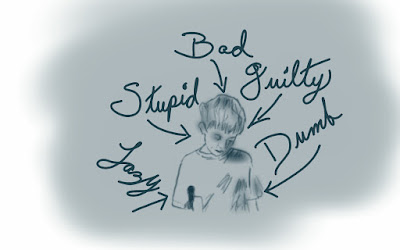In the country where I'm currently living, many people have a weird view of what an "error" is. Whoever commits a mistake is considered as guilty; thus, everybody fears the possibility of making errors. This is very perceptible in the work environment.
A deplorable consequence of this attitude is that it prevents people from trying something better, it prevents them from innovating.
Their usual attitude is to stop when the solution is just enough. Trying to find a better solution could lead them into an error, and thus into a punishment.
Their usual attitude is to stop when the solution is just enough. Trying to find a better solution could lead them into an error, and thus into a punishment.
"An expert is a person who has made all the mistakes that can be made in a very narrow field."
Niels Bohr
It perfectly shows that "failing" is the normal process of learning. What is important is to make the most of those experiences ant not to fail again in the same points.
More successful people in science history have demonstrated that it is important to test many different paths before finding the final solution. For example, Thomas A. Edison has expressed in his known quote that he has had much more failing results than successful ones.
More successful people in science history have demonstrated that it is important to test many different paths before finding the final solution. For example, Thomas A. Edison has expressed in his known quote that he has had much more failing results than successful ones.
"I have not failed. I've just found 10,000 ways that won't work."
Thomas A. Edison
In my working experience I have found some so called "managers" who always searched for the "guilty" person. Every time something wrong happened, these persons tried to find a guilty; of course, it was never himself.
In my opinion, it is not important who is the responsible of the error since most of the times it is due to a mistake, a lack of attention, and it is pretty probable that the person will not make the same error again.
Instead of wasting energies and polluting the atmosphere over the team by searching for a guilty, all the energies should be focused in finding a solution and in deploying it as a team.
This management attitude shall certainly motivate the team to try new solutions, to improve what it's already done without fearing to be punished if an error occurs.
Atychiphobia or "Fear of Failure"
Atychiphobia is the abnormal, unwarranted, and persistent fear of failure, a type of specific phobia. As with many phobias, atychiphobia often leads to a constricted lifestyle, and is particularly devastating for its effects on a person’s willingness to attempt certain activities. The term atychiphobia comes from the Greek phóbos, meaning "fear" or "morbid fear" and atyches meaning "unfortunate".
ttps://en.wikipedia.org/wiki/Atychiphobia
Fear of failure or fear of punishment?
I know many persons suffering from a light version of Atychiphobia; and they do not know it. of course this is not their fault since they have get used to that along their life.But, in fact, if we analyse the situation, they are not afraid of failing, that is only a consequence. In reality, they fear the punishment, they fear the fact of being spotted as the guilty person.
For innovation teams it is very important to unchain the team by removing all the limits raised by the guilty-culture. It is essential to motivate the teams to try new solutions, to discover new paths without fearing the consequences of failing; knowing that failing is the normal way to a success story.
What would you attempt to do if you knew you could not fail?
---------------------------------------------
What would you attempt to do if you knew you wouldn't be punished for not succeeding?







